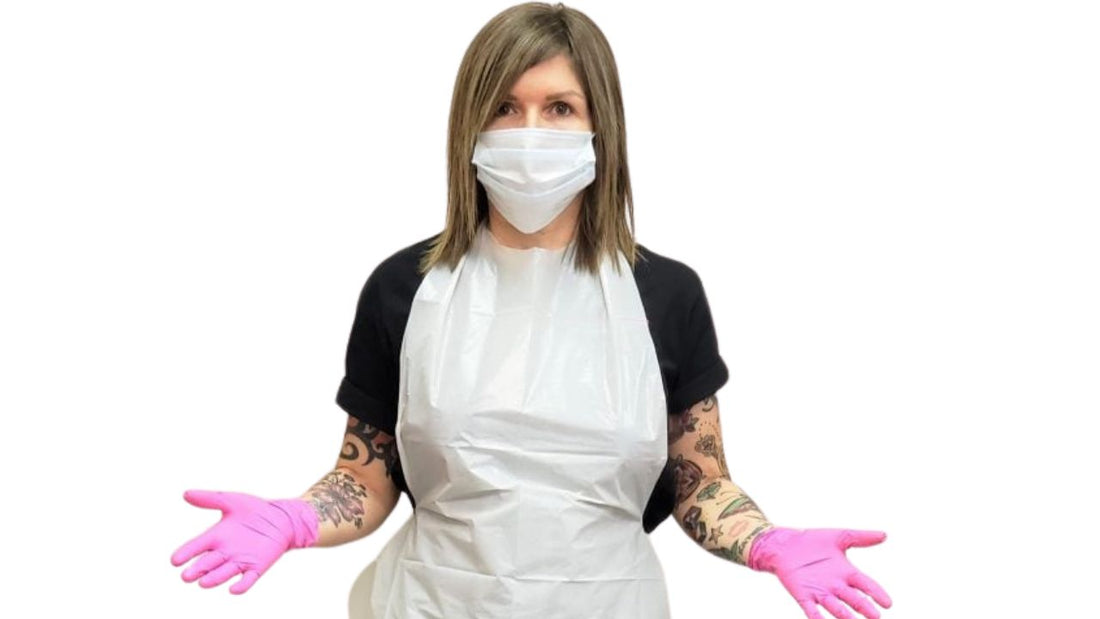
Stay Safe, Stay Sterile: A PMU Artist’s Guide to PPE & Bloodborne Pathogen Protection
If you’re in the Permanent Makeup industry, you already know that personal protective equipment—better known as PPE—isn’t optional. It’s essential. But PPE isn’t just for us. Chefs, nail techs, tattoo artists, and even window washers use PPE every single day. Why? Because they’re all at risk of cross contamination and pathogen exposure—and so are we.
As PMU artists, we work up close and personal with skin and blood. That means the risk of coming into contact with bloodborne pathogens (BBPs) like Hepatitis B, Hepatitis C, and HIV is real. That’s why understanding and using proper PPE is one of the most important things you can do—not just for your safety, but for your clients’ as well.
Let’s break down everything you need to know to stay compliant, stay safe, and keep your studio clean.
Why Bloodborne Pathogen (BBP) Training Is a Must

Bloodborne pathogens are microscopic organisms found in human blood and body fluids. These pathogens can live on surfaces and transfer easily if you're not properly protected. Transmission can happen through:
- Broken or damaged skin
- Contaminated tools or surfaces
- Accidental needle sticks
Every PMU artist should complete Bloodborne Pathogen training at least once per year. Online or in-person options are available—just make sure your training is OSHA-compliant and tattoo/body art industry-specific.
Essential PPE for Every PMU Procedure
Here’s your must-have list of protective gear for every procedure you perform.

1. Gloves
-
-
Use nitrile gloves only—latex breaks down with petroleum-based products and can cause allergic reactions.
-
Must fit snugly (remember: “if it doesn’t fit, it’s not PPE!”).
-
Change gloves if torn, overly soiled, or when switching tasks.
-
After removing gloves, wash your hands for at least 20 seconds at a proper hand-washing station.
-

2. Medical Masks
-
-
Always wear a medical-grade mask to protect yourself from fluid exposure near your mouth and nose.
-
Avoid cloth masks—they’re not sufficient for this work.
-
3. Waterproof Aprons
-
- Wear a durable, waterproof apron to protect your clothes and prevent cross contamination.
- Bloodborne pathogens can live on surfaces for up to 4 hours, so don’t let fluids absorb into your clothing.
4. Wash Bottle Bags
-
-
Bag your alcohol, diluting solutions, and cleansers.
-
Never place unbagged bottles on your work tray.
-
Bottle bags only cover the top—so placing them directly on the tray defeats the purpose.
-
5. Disposable Arm Sleeves
-
-
Extra layer of protection against fluids, ink splatter, and debris.
-
Optional—but highly recommended.
-
6. Machine Bags or Grip Tape
-
-
Your PMU machine gets close to fluids and blood.
-
Always cover it completely to prevent contamination.
-
7. Power Cord Covers
-
-
Use durable sleeves to cover cords connected to your machine.
-
Don’t let unprotected cords dangle or drag across surfaces.
-
8. Tray Trash Bags
-
-
Use a designated trash bag for soiled disposables on your tray.
-
Keeps your workspace organized and prevents cross contamination.
-
9. Bed and Tray Coverings
-
-
Always use plastic coverings on both your procedure bed and tray.
-
Prevents fluids like blood or lymph from contaminating your surfaces.
-
Clean-Up & Disposal: What Happens After the Procedure?
-
-
Use a medical-grade disinfectant like CaviCide to wipe down all surfaces.
-
Always use disposable microblades, needles, and grips.
-
Dispose of sharps in a proper sharps container immediately after use.
-
Safety Isn’t Extra—It’s Everything
Keeping it clean isn’t about being extra—it’s about being professional, responsible, and licensed to do this work the right way. Following proper PPE protocols not only protects you, it protects your clients and your reputation. Because nothing should come before safety.
💬 Pro Tip:
Stock up on all your PPE essentials at Girlz Ink’s Barrier Products Collection. From gloves and aprons to machine covers and more—we’ve got your back so you can focus on flawless work.

FAQ: PPE for PMU Artists
Q: How often should I replace my gloves during a PMU procedure?
A: Anytime they tear, become overly soiled, or if you switch tasks. Multiple glove changes in one session are normal and recommended.
Q: Can I use cloth masks instead of medical-grade ones?
A: No. Cloth masks don’t provide the same level of fluid resistance needed for PMU procedures.
Q: Do I need to bag my PMU machine?
A: Absolutely. Your machine is one of the closest tools to blood and fluid—bagging it is critical for preventing contamination.
Q: How long can bloodborne pathogens survive on surfaces?
A: Some can live for up to 4 hours—making surface disinfection and PPE critical.